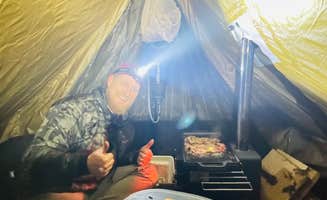Dispersed camping near Burkesville, Kentucky encompasses several primitive sites along the Tennessee-Kentucky border. The region sits within the Cumberland River watershed and features rolling hills with elevations ranging from 500 to 1,500 feet. Winter temperatures frequently drop below freezing, and summer brings humid conditions with temperatures reaching into the 90s, requiring campers to prepare accordingly with seasonal gear.
What to do
Fishing opportunities: Rock Creek contains multiple fishing spots with smallmouth bass, bluegill, and catfish. According to one visitor at Trace Branch Dispersed - Rock Creek Road, "We took our portable firepit and sat by the creek for a beautiful evening." Creek access points vary by campsite location.
Wildlife observation: The Cumberland Plateau region supports diverse wildlife including white-tailed deer, wild turkeys, and various bird species. Morning and evening hours provide optimal viewing times. Bring binoculars and maintain distance from any animals encountered.
Hiking nearby trails: Several unmarked trails connect to dispersed campsites. A camper mentioned, "We left our site unattended for hours to check out the streams and rivers and nothing was missing." Most trails are moderate difficulty with limited signage, requiring navigation skills.
What campers like
Natural solitude: Many sites offer significant privacy despite occasional vehicle traffic. "There were a few cars that drove through the middle of the night but no issues," notes a winter camper at Trace Branch. The further down gravel access roads you travel, the more secluded sites become.
Water proximity: Camping spots located directly along creeks and streams allow for easy access to water for filtering (treatment required). One visitor appreciated that their site had "One picnic table and fire pit. Dispersed camping." Sites vary in their distance from water sources.
Cost-free camping: All dispersed camping areas near Burkesville operate under free access policies with no reservation systems. This makes spontaneous trips possible, though holiday weekends may see increased competition for prime spots.
What you should know
Vehicle requirements: Access roads to dispersed sites often feature loose gravel, occasional potholes, and can become slippery after rainfall. High-clearance vehicles are recommended for reaching the more remote camping locations at Cordell Hull Horseback Trails, particularly after weather events.
Supply planning: No services exist within at least 8 miles of most sites. Pack all necessary food, water, and equipment for the duration of your stay. A January camper noted, "Luckily we had heavy duty stakes that could get through the ground" when tent camping on frozen ground.
Site selection timing: Arrive during daylight hours to properly assess site conditions and set up camp. "There are more sites down the gravel road but we went with the first one we came to," explains one visitor, highlighting that better options may exist beyond initial visible sites.
Tips for camping with families
Safety precautions: Camping near Rock Creek requires water safety awareness for families with children. Creek depths vary seasonally, and no lifeguards monitor swimming areas. Banks can be slippery after rainfall.
Glass hazard awareness: Previous campers have reported broken glass at some sites. One visitor mentioned, "Lots of beer bottles left over and shattered so I had to pick up the trash before letting my dog out." Bring sturdy footwear and inspect sites upon arrival.
Weather preparation: The region experiences rapid temperature changes, especially in spring and fall. Pack additional layers and rain gear regardless of forecast. During winter, waterways can freeze completely—"The entire river was frozen over and ponds were frozen too" during a January camping trip.
Tips from RVers
Site limitations: Most dispersed areas have minimal designated parking for larger vehicles. RVs exceeding 25 feet may struggle with turnarounds at end-of-road sites. Scout potential spots without your trailer attached when possible.
Level site scarcity: Natural terrain provides few perfectly level parking areas for RVs. Bring leveling blocks and wheel chocks as most sites feature some degree of slope. Areas closest to water typically have the most uneven ground.
Campfire alternatives: Established fire rings exist at select sites, but their condition varies. A camper recommended, "We took our portable firepit" which provides flexibility in site selection while minimizing impact on the environment.


